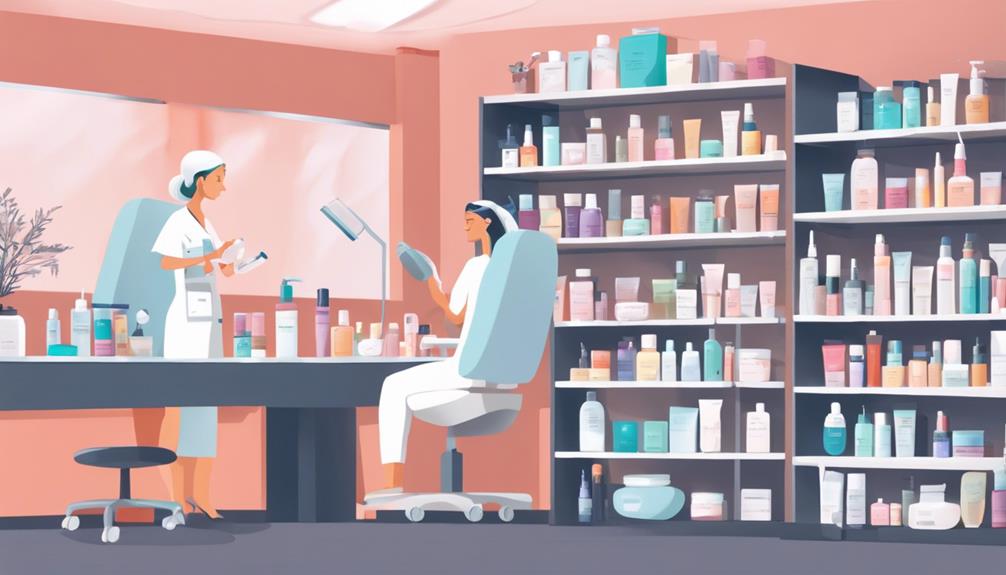What Are Effective Treatments for Acne and Other Skin Issues?
Did you know that nearly 85% of people between the ages of 12 and 24 experience acne at some point?
With a myriad of treatment options available, from topical remedies and oral medications to professional procedures and lifestyle changes, finding the right solution for your skin concerns can be overwhelming.
Understanding the effectiveness of each approach and how they can be tailored to your skin type and specific issues is key to achieving clear and healthy skin.
Key Takeaways
- Use topical treatments like benzoyl peroxide and retinoids for acne management.
- Consider oral medications such as antibiotics or isotretinoin for severe cases.
- Incorporate hormonal therapy for acne linked to hormonal imbalances.
- Embrace comprehensive approaches like dietary changes and self-care practices for holistic acne treatment.
Topical Treatments
For clearer skin, consider incorporating topical treatments into your skincare routine to target acne and other skin issues effectively. When it comes to skincare routines, using topical treatments can make a significant difference in managing acne. Look for products containing ingredients like benzoyl peroxide, salicylic acid, or retinoids, as these are known to help with acne by unclogging pores, reducing inflammation, and promoting skin cell turnover.
Product recommendations for acne-prone skin often include cleansers, spot treatments, and moisturizers specifically formulated to combat breakouts. It’s essential to follow the instructions provided with each product to maximize effectiveness and minimize potential side effects. For more tailored solutions, consider exploring Maysama.
While it’s tempting to try DIY treatments, common misconceptions such as using toothpaste or lemon juice can actually worsen acne and irritate the skin. Opting for scientifically proven topical treatments is a safer and more reliable approach to improving skin health. Remember, consistency is key when incorporating these products into your skincare routine for optimal results.
Oral Medications
When struggling with persistent acne, oral medications can offer effective solutions. Antibiotics are commonly prescribed to combat acne-causing bacteria.
Isotretinoin, though highly effective, may come with side effects that need careful consideration.
Hormonal therapy presents another option for those with acne related to hormonal imbalances.
Antibiotics for Acne
Oral antibiotics are a common treatment prescribed by dermatologists for moderate to severe cases of acne. They work by reducing inflammation and targeting acne-causing bacteria.
While antibiotics can be effective in improving acne symptoms, concerns about antibiotic resistance have arisen due to their widespread and sometimes unnecessary use. Dermatologists often recommend oral antibiotics for short periods to minimize this risk.
Additionally, long-term efficacy is another consideration when using antibiotics for acne. Some individuals may experience a recurrence of acne once the antibiotic course is completed. Therefore, it’s essential to follow your dermatologist’s instructions carefully and combine antibiotics with other acne treatments for optimal results while minimizing the risk of antibiotic resistance.
Isotretinoin Side Effects
When facing severe acne cases, isotretinoin, an oral medication, may be considered after antibiotics. Isotretinoin is known for its effectiveness in managing stubborn acne or persistent skin issues.
However, it’s essential to be aware of potential side effects. Isotretinoin can have significant mental health implications, as some individuals may experience mood changes or depressive symptoms while taking this medication. Additionally, there are long-term effects to consider, such as dry skin, potential joint pain, and in rare cases, liver abnormalities.
It’s crucial to discuss these potential side effects with your healthcare provider before starting isotretinoin to ensure you’re fully informed and prepared for the treatment journey.
Hormonal Therapy Options
Consider hormonal therapy options as a treatment for acne and skin issues. Hormonal imbalances can often contribute to persistent acne problems, especially in adult women. Treatment plans may include oral medications such as combined oral contraceptives or anti-androgen drugs.
Combined oral contraceptives containing estrogen and progestin can help regulate hormones, reducing sebum production and preventing acne breakouts. Anti-androgen medications like spironolactone can block the effects of androgens on the skin, leading to fewer acne lesions.
These hormonal therapy options are typically prescribed when other treatments like topical medications haven’t been effective or in cases where hormonal factors play a significant role in acne development. Consult with a healthcare provider to determine the most suitable hormonal therapy for your skin concerns.
Professional Procedures
For more severe cases of acne, professional procedures such as laser treatments, chemical peels, microneedling, and dermabrasion may be recommended by dermatologists to effectively target deep-rooted skin issues. Laser therapy focuses on reducing acne by targeting the sebaceous glands, which produce oil that can clog pores. It also helps in reducing inflammation and bacteria on the skin, leading to improved acne symptoms. Chemical peels work by exfoliating the top layers of the skin, unclogging pores, and reducing acne lesions.
Microneedling involves creating tiny punctures in the skin to stimulate collagen production and enhance the absorption of topical treatments, which can improve the appearance of acne scars and skin texture. Dermabrasion is a procedure that mechanically exfoliates the skin to remove damaged outer layers, revealing smoother skin underneath.
These professional procedures are best performed by qualified dermatologists or skincare professionals to ensure safety and efficacy. It’s essential to consult with a specialist to determine the most suitable treatment option based on individual skin concerns and severity of acne.
Lifestyle Changes
To address skin issues like acne effectively, incorporating lifestyle changes can play a crucial role in improving your overall skin health. Two key lifestyle changes that can significantly impact your skin are diet modifications and stress management.
Lifestyle Changes for Improved Skin Health
| Lifestyle Change | Description | Benefits |
|---|---|---|
| Diet Modifications | Incorporating more fruits | Provides essential vitamins and antioxidants for |
| and vegetables in your | healthy skin. | |
| diet can help improve | ||
| skin health. | ||
| Stress Management | Engaging in relaxation | Reduces the production of stress hormones which |
| techniques such as yoga | can lead to fewer breakouts and improved skin | |
| or meditation can help | overall. |
Natural Remedies
Exploring natural remedies can offer effective solutions for managing acne and other skin issues, providing alternative approaches to traditional treatments. DIY facemasks are a popular natural remedy for treating acne. Ingredients like honey, yogurt, aloe vera, and tea tree oil can help soothe the skin, reduce inflammation, and combat bacteria that cause acne. These facemasks can be easily made at home and applied weekly for noticeable improvements in skin health.
In addition to facemasks, herbal supplements have gained popularity for their potential skin benefits. Herbal supplements like turmeric, green tea extract, and evening primrose oil are known for their anti-inflammatory and antioxidant properties, which can help improve overall skin condition. However, it’s crucial to consult with a healthcare provider before incorporating herbal supplements into your skincare routine to ensure they’re safe and suitable for your specific skin concerns.
When considering natural remedies for acne and other skin issues, DIY facemasks and herbal supplements can be valuable additions to your skincare regimen, offering gentle yet effective alternatives to traditional treatments.
Combination Therapies
Combining multiple treatment modalities can significantly enhance the effectiveness of addressing acne and other skin issues. Here are some key strategies to consider:
- Integrating Dietary Changes: Adjusting your diet to include more fruits, vegetables, and foods rich in antioxidants can help improve skin health from the inside out. Avoiding processed foods and excessive sugar intake may also benefit your skin.
- Enhancing Your Skincare Routine: Incorporating gentle cleansers, non-comedogenic moisturizers, and targeted treatments like salicylic acid or benzoyl peroxide can help manage acne and promote overall skin wellness.
- Exploring Alternative Therapies: Complement traditional treatments with alternative therapies such as acupuncture, herbal remedies, or light therapy to potentially enhance the efficacy of your skincare regimen.
- Prioritizing Self-Care Practices: Stress management techniques, adequate sleep, and regular exercise can all play a significant role in improving skin conditions. Taking care of your overall well-being is essential for healthy skin.
Conclusion
In conclusion, when it comes to treating acne and other skin issues, there are a variety of effective options available. From topical treatments and oral medications to professional procedures and lifestyle changes, finding the right combination therapy is key.
Remember, skincare isn’t a one-size-fits-all solution. Just like a painter mixes colors on their palette to create a masterpiece, combining different treatments can help you achieve clearer, healthier skin.







